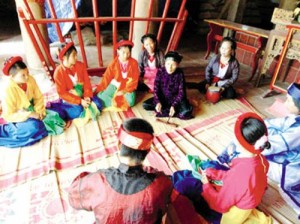On December 24, 2011, at the 6th Meeting of the Inter-governmental Committee for the Conservation of Intangible Cultural Heritage of UNESCO held in Bali, Indonesia, Vietnam’s Xoan singing in Phu Tho was officially recognized by UNESCO as an Intangible Cultural Heritage of Humanity in need of urgent protection.
Phu Tho is regarded as the ancestral land and the root of the Vietnamese people. In this very place, more than 4,000 years ago, the Hung Kings founded the country of Van Lang, the first state of Vietnam. From this cradle, a lot of valuable cultural heritage of the Vietnamese people was established. Of these there is Xoan singing, a type of folk singing with the community’s cultural features and spiritual factors of the ancient Vietnamese people.
 According to research, Xoan singing is a genies-worshipping ritual. It consists of various elements, such as music, singing and dancing. Xoan singing is usually performed at communal houses and in early spring. There are three basic forms of Xoan singing, including singing to worship the Hung Kings and the village’s tutelary god, singing in a ceremony to pray for bumper crops and good health, and singing at the festivals where men and women sing duet love songs. (Read more about The Hung King Temple Festival)
According to research, Xoan singing is a genies-worshipping ritual. It consists of various elements, such as music, singing and dancing. Xoan singing is usually performed at communal houses and in early spring. There are three basic forms of Xoan singing, including singing to worship the Hung Kings and the village’s tutelary god, singing in a ceremony to pray for bumper crops and good health, and singing at the festivals where men and women sing duet love songs. (Read more about The Hung King Temple Festival)
Xoan singing is associated with the stories about the era of the Hung King’s national construction. The original villages with Xoan-singing are ancient villages located in the centre of the old country of Van Lang, present-day Viet Tri City in Phu Tho Province. These villages include An Thai, Phu Duc, Kim Doi and Thet in Kim Duc and Phuong Lau Communes (Viet Tri City, Phu Tho province). This art has retained many ancient cultural features from the time when the Hung Kings built the country.
After 4,000 years, Xoan singing still contains traces of the ancient music of the Vietnamese people. It is also the first professional musical genre with a rather close organization. A Xoan-singing group is a village artistic organization. Most of its members are close relatives. The head of the group is responsible for bequeathing the singing and organizing the performance. In Xoan singing, dancing and singing always go together. The performers use dance to illustrate the lyrics.
In the old days, in early Spring every year, the Xoan-singing groups performed at communal houses or temples of the village. On the 5th day of the Vietnam Lunar New Year they went to the Hung Kings’ Temple to perform. The custom of singing at the communal house was aimed at wishing each other good luck and praying to the genies. It also provided an opportunity for people in different villages to interact with each other. As a rule, the group organizing the performance was considered older brother and the group coming from another village was considered younger brother. Once these villages came together, boys and girls of both sides were forbidden to marry each other because they were considered siblings.
Xoan singing is an invaluable intangible cultural heritage. However, over time, it has become at risk of falling into oblivion due to the negative impact of modern society. According to surveys, the old Xoan songs are now preserved in only four original Xoan-singing groups in Phu Tho, including An Thai Village (Phuong Lau Commune) and Thet, Phu Duc and Kim Doi Villages (Kim Duc Commune).
Phu Tho Province has only 69 Xoan singing artisans, 31 of whom are from 80 to 104 years old, and only 8 people can teach singing. There are 81 Xoan singers but only 49 of them can sing fluently. Of the 30 relics of temples and shrines which were places for Xoan performances, only 13 remaining relics have been preserved, two relics have been severely degraded and 15 relics have completely disappeared.
 These figures show that the teaching of Xoan singing to younger generations has many difficulties. Nguyen Thi Lich, a Xoan singing artisan, said: “In the past, Xoan singing was popular and performed at all festivals of the village, but with changes over time this art and the number of Xoan singing artisans has been on the decline.”
These figures show that the teaching of Xoan singing to younger generations has many difficulties. Nguyen Thi Lich, a Xoan singing artisan, said: “In the past, Xoan singing was popular and performed at all festivals of the village, but with changes over time this art and the number of Xoan singing artisans has been on the decline.”
Facing the fact that Xoan singing is at the risk of becoming lost, Phu Tho Province co-operated with the Vietnam National Conservatory and the National Cultural Heritage Department of the Ministry of Culture, Sports and Tourism to carry out surveys. They organized many domestic and international workshops to assess the actual state of Xoan singing so as to prepare a dossier to submit to UNESCO for being recognized as an intangible cultural heritage in need of urgent protection.
On November 24, 2011, in Bali (Indonesia), UNESCO officially recognized Phu Tho’s Xoan singing as an Intangible Cultural Heritage of Humanity that needs to be urgently protected. This is not only good news for the people and authorities of Phu Tho Province, the birthplace of a unique type of singing, but also a great honour for all Vietnamese people.
Enjoy Xoan singing by video:
Do you know Ca Tru Vietnam – The Masterpiece of the Oral and Intangible Heritage of Humanity?
Source: VNP
